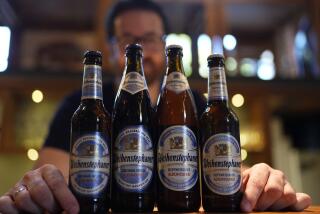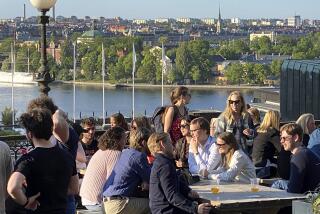Campaign Drives Swedes to Softer Drinks
- Share via
STOCKHOLM — Hard drinking Swedes are turning to softer options as the government pursues a campaign to cut its alcohol-related losses.
“For the Swedish state, alcohol is a losing affair. The calculation is that the cost to society of alcohol consumption is four times as high as the intake from taxes,” said Gabriel Romanus, managing director of the state alcohol monopoly, Systembolaget.
Swedes still concentrate on the hard stuff, with 41% of Systembolaget sales consisting of spirits. But spirit sales have dropped by one third in the past decade while wine sales have grown by 40%, helped partly by an energetic campaign by the monopoly to encourage wine drinking.
Consumption of so-called strong beer--Swedish beer comes in three grades--rose more than fivefold between 1976 and 1987.
Systembolaget will not serve customers in any of its 339 shops if they appear to be drunk, and the shops are closed weekends.
Alcohol is available in Swedish bars and restaurants, but must be served with food and prices are prohibitive.
It’s all part of Sweden’s campaign to reduce alcohol consumption by 25% by the end of the century.
Sales measured in liters of pure alcohol have fallen by more than 20% since 1975 and deaths from alcohol-related diseases have dropped sharply to one of the lowest rates in Europe.
“Swedes have a different way of drinking from some other Europeans,” said Systembolaget’s information chief Bjorn Riberg.
“Unlike Frenchmen and Italians, who drink wine every day, Swedes drink in order to get drunk and their drinking is concentrated on weekends,” he said.
Systembolaget does around 40% of its business on Fridays when hordes of people rush to stock up for the weekend, sometimes standing in line half an hour or more.
“We used to be open on Saturday until Parliament decided in 1983 that we should not be. The aim was to keep people more sober over the weekend. It’s had a positive effect if you look at figures for things like the number of women abused or beaten up over the weekend,” said Riberg.
Small groups of forlorn drunks hanging around outside liquor stores hoping to persuade other customers to buy for them testify to the fact that the system can bite.
Despite a strong temperance movement, Sweden never tried full-scale prohibition. A 1922 referendum on the issue resulted in a narrow 51% to 49% majority against prohibiting all alcohol sales.
“Paradoxically, the fact that Sweden never had a prohibition experience meant that the temperance movement stayed strong here and was not discredited as happened elsewhere,” said Romanus.
With annual wine sales of around 100 million liters, Systembolaget has emerged as one of the biggest wine buyers in the world. Wine-growing countries compete eagerly for its business and the monopoly often buys up the entire production of individual vineyards. About 90% of imported wine is bottled in Sweden.
Systembolaget shops display wine prominently, alongside alcohol-free wine and leaflets explaining the dangers of alcoholism and giving advice on seeking help for drink problems.
Swedish tax laws are intended to cut consumption. Over 90% of the retail price of spirits goes to the state, while the tax on wine is 65% and on beer 55%.
The government imposes tough punishments on drunk drivers and is currently drawing up legislation to lower the legal limit of alcohol in the blood to near zero.
The campaign has not prevented Sweden earning over $300 million a year through its vodka exports.
Swedish Absolut Vodka has captured half of the lucrative U.S. market for imported vodka through an aggressive and imaginative advertising campaign.
More to Read
Sign up for Essential California
The most important California stories and recommendations in your inbox every morning.
You may occasionally receive promotional content from the Los Angeles Times.













